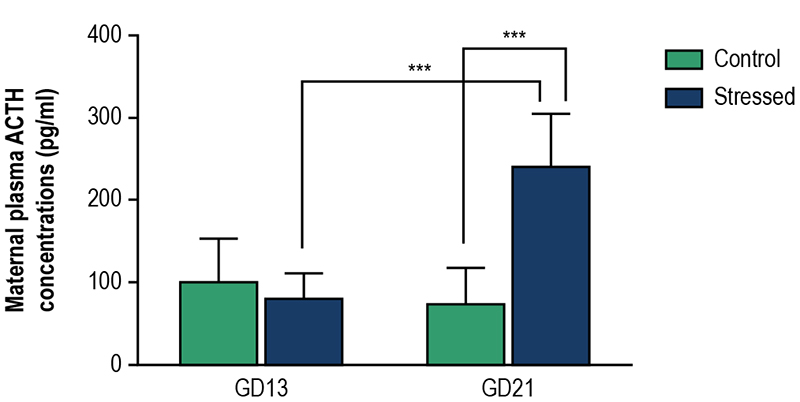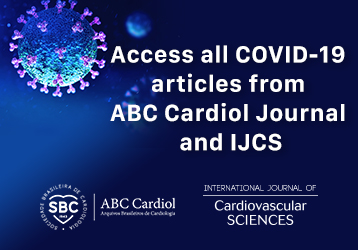Volume 112, Nº 1, January 2019
DOI: http://www.dx.doi.org/10.5935/abc.20190001
ORIGINAL ARTICLE
Sex–Related Effects of Prenatal Stress on Region-Specific Expression of Monoamine Oxidase A and β Adrenergic Receptors in Rat Hearts
Tanja Jevdjovic
Tamara Dakic
Sonja Kopanja
Iva Lakic
Predrag Vujovic
Nebojsa Jasnic
Jelena Djordjevic
Dra. Tanja Jevdjovic

Figure 1 – Maternal plasma ACTH concentrations before (GD13) and following (GD21) exposure to CUMS during pregnancy. Data are expressed as mean ± SD, control group (open bars, n =5), stressed group (black bars, n = 6). In the stressed group on GD21 two samples were excluded due to hemolysis. ***p < 0.001, 2-way ANOVA and Bonferroni’s multiple comparison test.
Abstract
Background: Prenatal stress may increase risk of developing cardiovascular disorders in adulthood. The cardiotoxic effects of catecholamines are mediated via prolonged adrenergic receptor stimulation and increased oxidative stress upon their degradation by monoamine oxidase A (MAO-A).
Objectives: We investigated long-term effects of prenatal stress on β (1, 2, 3) adrenergic receptors and MAO-A gene expression in the hearts of adult rat offspring.
Methods: Pregnant rats were exposed to unpredictable mild stress during the third week of gestation. RNA was isolated from left ventricular apex and base of adult offspring. Quantitative PCR was used to measure gene expression in collected ventricular tissue samples. The level of significance was set to p < 0.05.
Results: β3 adrenergic receptor mRNA was undetectable in rat left ventricle. β1 adrenergic receptor was the predominantly expressed subtype at the apical and basal left ventricular myocardium in the control females. Male offspring from unstressed mothers displayed higher apical cardiac β1 than β2 adrenergic receptor mRNA levels. However, β1 and β2 adrenergic receptor mRNAs were similarly expressed at the ventricular basal myocardium in males. Unlike males, prenatally stressed females exhibited decreased β1 adrenergic receptor mRNA expression at the apical myocardium. Prenatal stress did not affect cardiac MAO-A gene expression.
Conclusions: Collectively, our results show that prenatal stress may have exerted region- and sex-specific β1 and β2 adrenergic receptor expression patterns within the left ventricle. (Arq Bras Cardiol. 2019; 112(1):67-75)
Keywords: Pregnancy; Stress, Physiological; Oxidative Stress; Heart; Catecholamines; Rats; Sex; Female; Cardiotoxicity; Adrenergic beta1 beta2 Receptor Antagonists.















